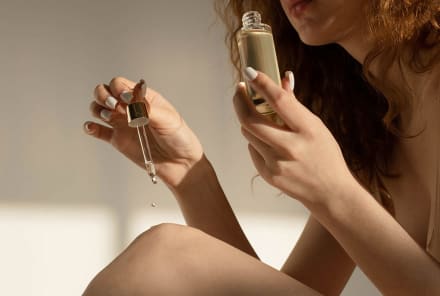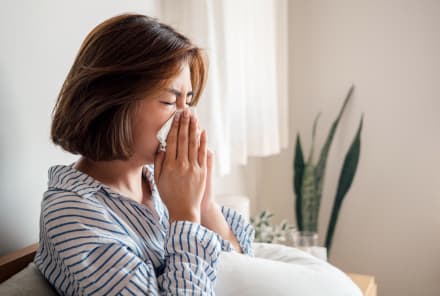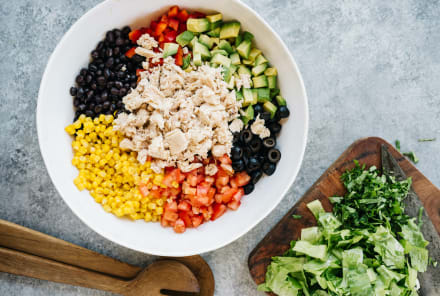Advertisement
Gabrielle Union On Perimenopause Depression, Sleep Tips & Her Mental Health Routine


"When we think about women's health, we tend to focus on the things that have the biggest impact on your 'duties,' if you will," actor and producer Gabrielle Union says over the phone. You know, vaginal dryness, libido—those physical-presenting symptoms akin to women's "traditional roles" in society.
These symptoms (and the discomfort they can cause) are important to address, for sure, but according to Union, we don't pay as much attention to the more "invisible" challenges brought on by the hormonal shifts of aging.
It's high time we change the narrative—so, well, Union gave us a peek into her own. Her memoir, You Got Anything Stronger? candidly walks us through her experience in a series of honest, vulnerable, raw conversations.
We got the chance to chat with Union about some of these essays, specifically her perimenopause diagnosis and everything she wished she knew back then.
Unfiltered and undeniably resilient, Union bares it all.
Her struggles with mental health
"We never think about the mental health aspect of perimenopause and menopause," Union explains. Sure, we often hear about menopausal mood swings, but that term doesn't exactly point to the whole spectrum of emotional challenges that can occur. "There's a host of ways it can manifest, mentally and emotionally."
For instance, Union opens up about her experience with passive suicidal ideation: "It's more of suicide as an idea, whereas someone being [actively] suicidal, there is a plan," she explains. Like a little voice inside your head, jumping in with those intrusive thoughts.
After surviving a violent rape at the age of 19, Union vowed to never second-guess that little voice inside her head saying something was off—so, now, when that same voice is inundating her with thoughts of suicide? It's frightening, to say the absolute least.
"I knew immediately that I didn't want to kill myself," she continues. "I didn't understand where this was coming from and why it was unrelenting."
Turns out, these ideations were a symptom of her perimenopause depression, uncovered after working with a professional to get to the bottom of it. "This is passive suicidal ideation," Union recounts.
"These are just thoughts. [My therapist] talked me through it, and we looped in my primary care physician and got a full blood workup to really understand what we were dealing with and what we can do to help balance those [hormones], so we can address some of these symptoms."
Today, Union thankfully no longer has passive suicidal ideations—but if she does, she now knows how to recognize it and take the necessary steps to overcome it.
Her challenges with sleep interruptions
Sleep is crucial for overall health and well-being (here are some reasons why, if you need a reminder), and difficulty sleeping is one of the most common issues for menopausal and perimenopausal women1, Union shared.
In the book, she mentions "a cocktail of things like CBD oil, melatonin, and vitamins, and that has worked wonders." During our call, though, she also conveys her affinity for magnesium: "[I use] magnesium powder; I put one scoop of powder in a little jar of water, shake that up, drink that with [a CBD] edible, and I've had amazing sleep," she says.
Her experience with painful periods
Perimenopause can increase period pain, according to research, and for Union, this results in what she can only describe as "a jackhammer in my back or my gut."
Instead of reaching for the traditional hot water bottle or heating pad, she's partial to aromatherapy neck wraps. "The smell is very soothing, along with the warmth," she notes.
"I also lie on the floor and put my feet up on my bed—for whatever reason, I get relief from some cramps." (A legs-up-the-wall yoga pose is A+ for better sleep, as well; experts also tout child's pose and supine twists to help relieve cramping.)
How she manages it all today
In terms of a daily game plan for her mental health, the routine looks different from day-to-day: Typically, she cycles through her favorite positive affirmation podcasts, relies on meditation, and kicks off each morning with a music playlist.
"A soundtrack to start my day off with some joy or peace," she notes. (Sometimes she's partial to a Kirk Franklin moment; other mornings she sings along to Mariah Carey.)
And if you're struggling with perimenopause or any hormone-related issue, Union highly recommends seeing your primary care physician for a full blood panel, if you're able. "See what your hormone levels are before you start coming up with your own fix-it kit; know what you're actually dealing with because those labs can tell you a lot," she says.
Overall, though, she emphasizes the importance of talking: to a therapist (if you can), to your doctor, to your support system. By sharing your story and hearing from others (like we do in Union's pages), it can help reframe the conversation around healthy aging and show you that you're never alone.
"It's OK to not be OK and to ask for help," she says. "For every challenge, there's usually a solution. So don't give up, don't throw in the towel—there are things that can be done to offer some relief."
Watch Next
Enjoy some of our favorite clips from classes
Enjoy some of our favorite clips from classes
What Is Meditation?
Mindfulness/Spirituality | Light Watkins
Box Breathing
Mindfulness/Spirituality | Gwen Dittmar
What Breathwork Can Address
Mindfulness/Spirituality | Gwen Dittmar
The 8 Limbs of Yoga - What is Asana?
Yoga | Caley Alyssa
Two Standing Postures to Open Up Tight Hips
Yoga | Caley Alyssa
How Plants Can Optimize Athletic Performance
Nutrition | Rich Roll
What to Eat Before a Workout
Nutrition | Rich Roll
How Ayurveda Helps Us Navigate Modern Life
Nutrition | Sahara Rose
Messages About Love & Relationships
Love & Relationships | Esther Perel
Love Languages
Love & Relationships | Esther Perel
What Is Meditation?
Box Breathing
What Breathwork Can Address
The 8 Limbs of Yoga - What is Asana?
Two Standing Postures to Open Up Tight Hips
How Plants Can Optimize Athletic Performance
What to Eat Before a Workout
How Ayurveda Helps Us Navigate Modern Life
Messages About Love & Relationships
Love Languages
Advertisement

Research Shows Vitamin Deficiency May Up Alzheimer's Risk By 59%
Molly Knudsen, M.S., RDN

Do You Know Your Metabolic Age? Here's How To Find Out (& Improve It)
Mallory Creveling, CPT

Research Shows Vitamin Deficiency May Up Alzheimer's Risk By 59%
Molly Knudsen, M.S., RDN

Do You Know Your Metabolic Age? Here's How To Find Out (& Improve It)
Mallory Creveling, CPT

Research Shows Vitamin Deficiency May Up Alzheimer's Risk By 59%
Molly Knudsen, M.S., RDN

Do You Know Your Metabolic Age? Here's How To Find Out (& Improve It)
Mallory Creveling, CPT

4 Health Symptoms That Might Be Triggered By Mold (& What To Do About It)
William Cole, IFMCP, DNM, D.C.

Research Shows Vitamin Deficiency May Up Alzheimer's Risk By 59%
Molly Knudsen, M.S., RDN

Do You Know Your Metabolic Age? Here's How To Find Out (& Improve It)
Mallory Creveling, CPT

4 Health Symptoms That Might Be Triggered By Mold (& What To Do About It)
William Cole, IFMCP, DNM, D.C.













